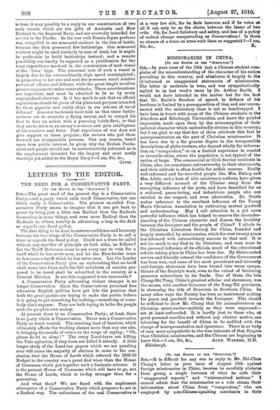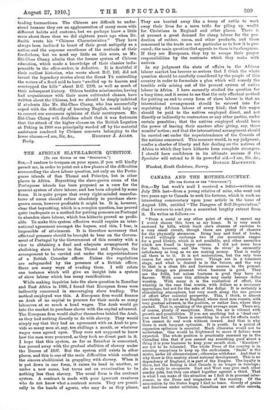(TO TM EDITOR CY TRU "SPBCTATOR."3
Sre.,—It is difficult for any one to reply to Mr. Shi-Chae Chang's letter in your issue of August 13th against foreign missionaries in China, because he carefully abstains from giving a single instance of what he calls their "exaggerated reports" and "misconceived notions." I cannot admit that the missionaries as a rule obtain their information about China from " compradors„" who are employed by non-Chinese-speaking merchants in their • trading transactions. The Chinese are difficult to under- stand because they are an agglomeration of many races with different habits and customs, but we perhaps know a little more about them than we did eighteen years ago when Dr. Smith wrote his 'Chinese Characteristics." They have always been inclined to boast of their great antiquity as a nation and the supreme excellence of the methods of their forefathers, but we need say little on this score, as Mr. Shi-Chao Chang admits that the former system of Chinese education, which made a knowledge of their classics indis- pensable to the office-seeker, is defective. It is doubtful if their earliest historian, who wrote about B.C. 100, did not invent the legendary stories about the Great Yii controlling the waters of a flood said to have "swelled up to heaven and overtopped the hills" about B.C. 2200, as well as much of their subsequent history. Others besides missionaries, having had acquaintance with their more cultivated classes, have written about the Chinese, but we should be deeply indebted if students like Mr. Shi-Chao Chang, who has successfully coped with the difficulty of learning English, would help us to correct our erroneous opinions of their countrymen. Mr. Shi-Chao Chang will doubtless admit that it was fortunate that the attack of the higher classes on the British Legation at Peking in 1900 was principally warded off by the material assistance rendered by Chinese converts belonging to the







































 Previous page
Previous page